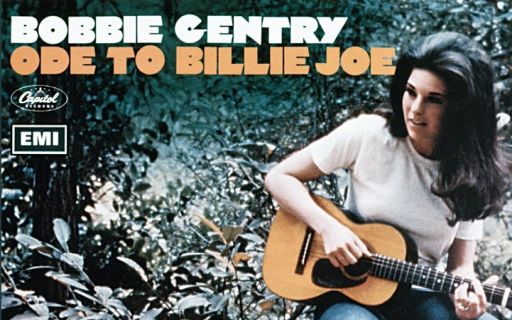This day in 1967, Bobbie Gentry released her only hit: “Ode to Billy Joe.”
The single was a number-one hit in the US within three weeks of release and a big international seller. Billboard ranked the record as the No. 3 song of the year. The recording remained on the Billboard chart for 20 weeks and was the Number 1 song for four weeks.
It generated eight Grammy nominations, resulting in three wins for Gentry and one for arranger Jimmie Haskell. “Ode to Billie Joe” has since made Rolling Stone’s lists of the “500 Greatest Songs of All Time” and the “100 Greatest Country Songs of All Time” and Pitchfork’s “200 Best Songs of the 1960s”.
The song takes the form of a first-person narrative performed over sparse acoustic accompaniment, though with strings in the background. It tells of a rural Mississippi family’s reaction to the news of the suicide of Billie Joe McAllister, a local boy to whom the daughter (and narrator) is connected. Hearsay around the “Tallahatchie Bridge” forms the narrative and musical hook. The song concludes with the demise of the father and the lingering, singular effects of the two deaths on the family. According to Gentry, the song is about indifference and unshared grief.
“Ode to Billie Joe” was originally intended as the B-side of Gentry’s first single recording, a blues number called “Mississippi Delta”, on Capitol Records. The original recording, with no other musicians backing Gentry’s guitar according to some reports, had eleven verses lasting eight minutes, telling more of Billie Joe’s story. The executives realized that this song would work best as a single, so they cut the length by almost half and added background music, strings, two cellos and four violins, according to Gentry.
The only surviving draft of the seven-minute version of “Ode to Billie Joe”, which consists of two handwritten pages, is located in the archive of the University of Mississippi. Gentry donated the draft to the University’s Faulkner room in 1973. In addition to the iconic lyrics that made the final cut, the unused lyrics may showcase Bobbie Gentry’s mindset and possible answer to mystery of what was thrown from the bridge; as well as the relationship of the narrator to Billie Joe. The shorter version left more of the story to the listener’s imagination, and made the single more suitable for radio airplay. In an interview with Bob Harris broadcast by BBC Radio 2 in Bob Harris Country on April 16, 2009, singer Rachel Harrington claimed that Gentry originally wrote 11 verses, but deleted six because a record producer thought the song was too long. The song is noted for its long descending scale by the strings at the conclusion, suggesting the flowers falling after being dropped off the Tallahatchie Bridge and ending up in the river water below.
In a later interview Gentry took full credit for the success of the record. “Did you know that I took “Ode to Billie Joe” to Capitol, sold it, and produced the album myself? It wasn’t easy. It’s difficult when a woman is attractive; beauty is supposed to negate intelligence – which is ridiculous. Certainly there are no women executives and producers to speak of in the record business.”
The song’s popularity proved so enduring that in 1976, nine years after its release, Warner Bros. commissioned author Herman Raucher to expand and adapt the story as a novel and screenplay, Ode to Billy Joe. The poster’s tagline, which treats the film as being based on a true story and gives a date of death for Billy (June 3, 1953), led many to believe that the song was based on actual events. The film was released in 1976, directed and produced by Max Baer, Jr, and starring Robby Benson and Glynnis O’Connor. Only the first, second, and fifth verses were sung by Bobbie Gentry in the film, omitting the third and fourth verses.
Soon after the song’s chart success, the Tallahatchie Bridge was visited by more individuals who wanted to jump off it. Since the bridge height was only 20 feet, death was unlikely. To curb the trend, the Leflore County Board enacted a law fining jumpers $100




